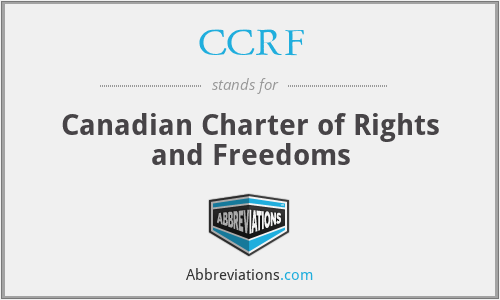What does CCRF mean in Canadian?
This page is about the meanings of the acronym/abbreviation/shorthand CCRF in the Regional field in general and in the Canadian terminology in particular.
Submitted by wikidude on July 30, 2019
Translation
Find a translation for Canadian Charter of Rights and Freedoms in other languages:
Select another language:
- - Select -
- 简体中文 (Chinese - Simplified)
- 繁體中文 (Chinese - Traditional)
- Español (Spanish)
- Esperanto (Esperanto)
- 日本語 (Japanese)
- Português (Portuguese)
- Deutsch (German)
- العربية (Arabic)
- Français (French)
- Русский (Russian)
- ಕನ್ನಡ (Kannada)
- 한국어 (Korean)
- עברית (Hebrew)
- Gaeilge (Irish)
- Українська (Ukrainian)
- اردو (Urdu)
- Magyar (Hungarian)
- मानक हिन्दी (Hindi)
- Indonesia (Indonesian)
- Italiano (Italian)
- தமிழ் (Tamil)
- Türkçe (Turkish)
- తెలుగు (Telugu)
- ภาษาไทย (Thai)
- Tiếng Việt (Vietnamese)
- Čeština (Czech)
- Polski (Polish)
- Bahasa Indonesia (Indonesian)
- Românește (Romanian)
- Nederlands (Dutch)
- Ελληνικά (Greek)
- Latinum (Latin)
- Svenska (Swedish)
- Dansk (Danish)
- Suomi (Finnish)
- فارسی (Persian)
- ייִדיש (Yiddish)
- հայերեն (Armenian)
- Norsk (Norwegian)
- English (English)
Definition
What does CCRF mean?
- Canadian Charter of Rights and Freedoms
- The Canadian Charter of Rights and Freedoms (French: La Charte canadienne des droits et libertés), in Canada often simply called the Charter, is a bill of rights entrenched in the Constitution of Canada. It forms the first part of the Constitution Act, 1982. The Charter guarantees certain political rights to Canadian citizens and civil rights of everyone in Canada from the policies and actions of all areas and levels of the government. It is designed to unify Canadians around a set of principles that embody those rights. The Charter was signed into law by Queen Elizabeth II of Canada on April 17, 1982, along with the rest of the Act. The Charter was preceded by the Canadian Bill of Rights, which was enacted in 1960. However, the Bill of Rights is only a federal statute, rather than a constitutional document. As a federal statute, it can be amended through the ordinary legislative process and has no application to provincial laws. The Supreme Court of Canada also narrowly interpreted the Bill of Rights and the Court was reluctant to declare laws inoperative. The relative ineffectiveness of the Canadian Bill of Rights motivated many to improve rights protections in Canada. The movement for human rights and freedoms that emerged after World War II also wanted to entrench the principles enunciated in the Universal Declaration of Human Rights. The British Parliament formally enacted the Charter as a part of the Canada Act 1982 at the request of the Parliament of Canada in 1982, the result of the efforts of the government of Prime Minister Pierre Trudeau. One of the most notable effects of the adoption of the Charter was to greatly expand the scope of judicial review, because the Charter is more explicit with respect to the guarantee of rights and the role of judges in enforcing them than was the Bill of Rights. The courts, when confronted with violations of Charter rights, have struck down unconstitutional federal and provincial statutes and regulations or parts of statutes and regulations, as they did when Canadian case law was primarily concerned with resolving issues of federalism. The Charter, however, granted new powers to the courts to enforce remedies that are more creative and to exclude more evidence in trials. These powers are greater than what was typical under the common law and under a system of government that, influenced by Canada's parent country the United Kingdom, was based upon Parliamentary supremacy. As a result, the Charter has attracted both broad support from a majority of the Canadian electorate and criticisms by opponents of increased judicial power. The Charter only applies to government laws and actions (including the laws and actions of federal, provincial, and municipal governments and public school boards), and sometimes to the common law, not to private activity.
Popularity rank by frequency of use
How popular is CCRF among other acronyms?
CCRF#1#23098#31140
Embed
Citation
Use the citation below to add this abbreviation to your bibliography:
Style:MLAChicagoAPA
"CCRF." Abbreviations.com. STANDS4 LLC, 2024. Web. 27 Apr. 2024. <https://www.abbreviations.com/term/2091951>.



Discuss this CCRF abbreviation with the community:
Report Comment
We're doing our best to make sure our content is useful, accurate and safe.
If by any chance you spot an inappropriate comment while navigating through our website please use this form to let us know, and we'll take care of it shortly.
Attachment
You need to be logged in to favorite.
Log In